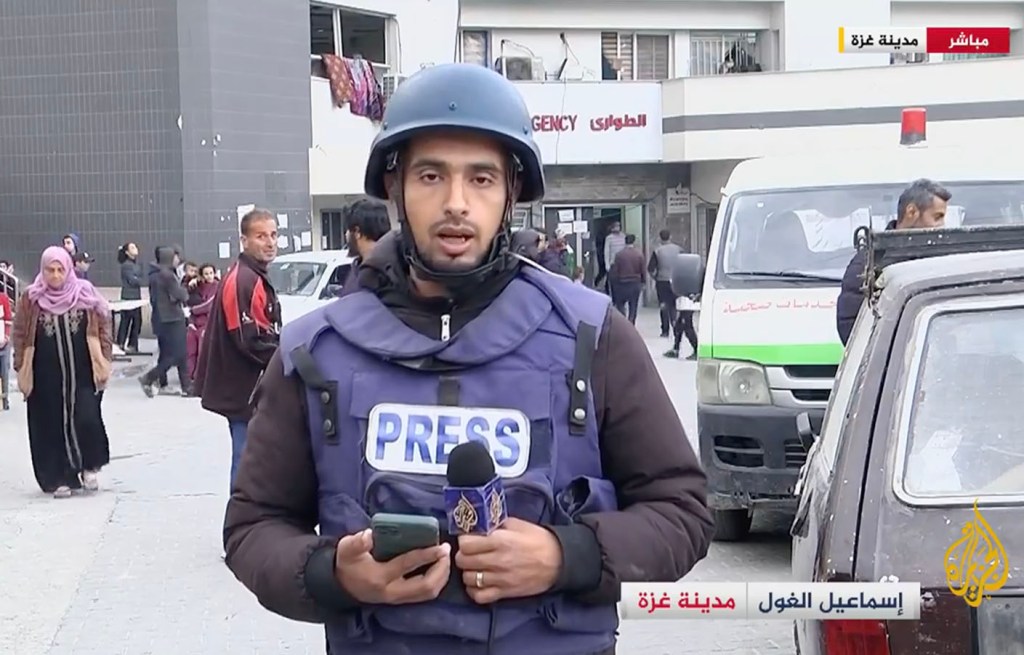On Monday night, Al-Jazeera reporter Ismail Al-Ghoul was released by Israeli forces after being held for nearly 12 hours.
In an interview with Al-Jazeera, Al-Ghoul recounted how he and several other journalists were assaulted by IDF soldiers, whom he said destroyed the journalists’ tent and damaged their equipment and press vehicles.
Al-Ghoul said the journalists were ordered to remove their clothes in the cold weather and were kept blindfolded and handcuffed in a room at Al-Shifa hospital.
“CPJ welcomes the release of Al-Jazeera journalist Ismail Al-Ghoul and some of the other journalists assaulted and detained by Israel on Monday, but we remain extremely concerned that they were blocked from covering a major military operation, denying them their press freedom rights,” said CPJ Program Director Carlos Martínez de la Serna.
Read more about Al-Ghoul’s detention and the high risks for journalists covering the Israel-Gaza war.
- Armed men take Nigerian journalist Segun Olatunji from Lagos home
- Journalist Md Shofiuzzaman Rana arrested, 5 correspondents confined in Bangladesh government office
- Journalist Padam Prasad Pokhrel attacked while covering alleged police assault in Nepal
- Pakistan court remands journalist Asad Ali Toor in cybercrime case
- CPJ calls on Senegal’s presidential candidates for press freedom reforms as 5 journalists freed
- CPJ welcomes release of DRC journalist Stanis Bujakera, calls for release of Blaise Mabala
- Togo suspends La Dépêche, calls Tampa Express publisher to court on defamation charge
- Russia jails journalist over plane crash coverage, detains another during election
- Azerbaijan extends pretrial detention of 2 journalists on currency smuggling charges
- Poland detains 4 Ukrainian journalists reporting at the border
- Kyrgyzstan parliament approves ‘foreign agents’ law
Spotlight
The Committee to Protect Journalists (CPJ) is calling on the kidnappers of journalist Lucien Jura to release him immediately and to not use journalists as pawns.
Jura was abducted from his home in Pétion-Ville on the outskirts of the capital, Port-au-Prince, on Monday, according to news reports. That same day, gangs attacked several homes in the area, leaving at least 10 dead.
“We are very concerned by the rapidly deteriorating security situation in Haiti and its impact on everyone in the country, including the journalists trying to keep the public informed,” said Katherine Jacobsen, CPJ’s U.S., Canada, and the Caribbean program coordinator.
Read more about Jura’s case.
Separately, on Tuesday, Hong Kong’s legislature unanimously passed a national security law which could lead to the suppression of press freedom and prosecution of journalists.
“The hasty passing of the law by the current legislative council and the Hong Kong government without meaningful consultation shows absolute disrespect for fundamental rights,” said Iris Hsu, CPJ’s China representative.
Read more about Hong Kong’s national security law.
What we are reading (and listening to)
- From Russia, elaborate tales of fake journalists — Steven Lee Myers, New York Times
- Believing in the job: Press freedom in the Middle East and North Africa — WAN-IFRA
- There is a global free speech recession and South Africa is not immune — Caroline James and Jacob Mchangama, amaBhungane
- Ahead of landmark elections, India’s government silences dissent — Kian Vesteinsson, Freedom House
- State of press freedom in Somalia 2023: Cyber-attack, arbitrary detentions and judicial harassment — Somali Journalists Syndicate
